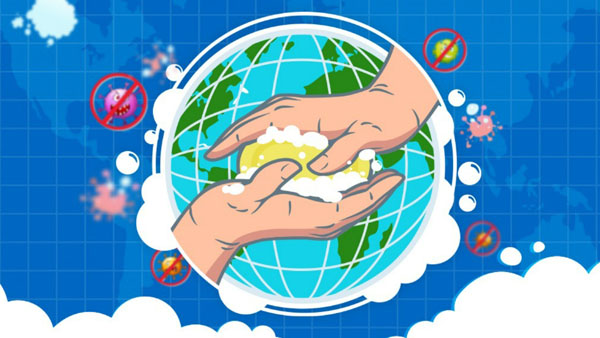By Dipak Kurmi
Every October 15th, the world comes together to celebrate an initiative that has become fundamental to global public health and wellbeing. Global Handwashing Day represents far more than a simple reminder to wash hands; it embodies a collective commitment to disease prevention, health security, and equitable access to basic hygiene. As we observe 2025’s commemoration, the resonant theme “Be a Handwashing Hero” serves as a powerful call to action, inviting every individual, organization, and government to assume responsibility for fostering clean hands in their communities and institutions. This multi-year theme transcends traditional public health messaging by positioning handwashing not as a passive habit but as a heroic act that can transform societies.
The significance of Global Handwashing Day extends deep into our understanding of disease transmission and prevention. Global Handwashing Day is a global advocacy day dedicated to increasing awareness about the importance of hand hygiene and triggering lasting change from the policy-level to community-driven action. Founded by the Global Handwashing Partnership, this annual observance has evolved into a beacon of health consciousness that illuminates the critical importance of proper hand hygiene across all demographics and geographic boundaries. The annual commemoration reminds us that something as elementary as washing hands with soap and water remains one of the most powerful defense mechanisms against infectious diseases and health crises.
The journey toward understanding the importance of handwashing spans centuries, yet its prominence in public health discourse has intensified in recent decades. A global advocacy day dedicated to increasing awareness about the importance of handwashing as an effective way to prevent diseases and save lives, Global Handwashing Day acknowledges that proper hygiene practices serve as fundamental infrastructure for disease prevention. What makes this observance particularly compelling is its universal applicability; handwashing transcends economic status, cultural boundaries, and technological advancement. Whether in resource-rich nations or developing regions facing infrastructural challenges, the simple act of washing hands with soap represents an equalizer in disease prevention strategy.
The multi-faceted impact of proper hand hygiene extends far beyond the obvious realm of infectious disease prevention. Research has documented that good hand hygiene practices contribute to reduced school absenteeism, improved educational outcomes, enhanced workplace productivity, and elevated levels of human dignity. When individuals have access to clean water and soap, alongside knowledge about proper handwashing techniques, entire communities experience cascading benefits that ripple through economic productivity, educational achievement, and overall wellbeing. Schools report fewer disruptions caused by preventable illnesses; businesses experience decreased healthcare claims and improved employee satisfaction; and healthcare facilities witness reduced transmission of both common and dangerous pathogens.
The 2025 theme “Be a Handwashing Hero” intentionally broadens the scope of responsibility and opportunity. Everyone, from young children to senior business and government officials, can be a handwashing hero. Anyone who wants to see the benefits of good hand hygiene in their community or country can lead efforts in their workplaces, schools, and communities. This inclusive framing recognizes that heroism in hand hygiene advocacy takes multiple forms. For government leaders, it involves incorporating handwashing targets into national health policies and budgets, thereby strengthening defenses against emerging disease threats and antimicrobial resistance. For business owners, heroism manifests through maintaining adequate handwashing stations, ensuring steady supplies of hygiene products, and integrating proper techniques into workplace safety protocols. For educators, it involves embedding hand hygiene education into curricula and creating institutional cultures where clean hands become normalized expectations. For parents and families, it means establishing household practices that protect loved ones and contribute to community health.
The economic argument for prioritizing handwashing has become increasingly compelling for policymakers and donors worldwide. Cost-benefit analyses reveal that investments in hand hygiene yield extraordinary returns; every dollar spent on handwashing and hygiene promotion can generate between thirty-five and ninety-two times the initial investment through reduced healthcare expenses and enhanced worker productivity. Despite this remarkable return on investment, the water, sanitation, and hygiene sector remains significantly underfunded relative to its public health importance. Meeting Sustainable Development Goals related to hygiene and sanitation requires annual investment increases of one hundred thirty-one to one hundred forty-one billion dollars, representing a near tripling of current spending in developing nations. This funding gap particularly affects poorer and rural communities, where access disparities remain pronounced.
Hand hygiene occupies a unique position within broader health and development frameworks. The practice is explicitly incorporated into the Sustainable Development Goals and contributes to multiple target areas including nutrition, education, general health, and economic growth. Integrating handwashing promotion into health, education, and nutrition programming becomes essential for achieving development objectives that extend beyond disease prevention. When children maintain good hand hygiene practices, school attendance improves, learning outcomes strengthen, and educational trajectories shift positively. When workers maintain proper hygiene, productivity increases and healthcare costs decrease, creating economic advantages that accumulate over time.
The institutional imperative for handwashing heroes cannot be overstated. Healthcare facilities, educational institutions, government offices, and businesses all represent critical settings where hand hygiene interventions deliver outsized impact. Hand hygiene programs in businesses can lower the incidence of hygiene-preventable health care claims by over twenty percent. In healthcare settings, proper handwashing practices directly correlate with reduced hospital-acquired infections, improved patient outcomes, and enhanced provider safety. In schools, robust hand hygiene programs reduce transmission of respiratory infections, gastrointestinal illnesses, and other communicable diseases, thereby supporting educational missions and reducing disruptions. In businesses, comprehensive handwashing programs protect employee health, enhance customer confidence, and strengthen organizational reputation.
Creating effective handwashing environments requires intentional infrastructure investment and behavioral change programming. Successful initiatives ensure multiple handwashing stations positioned at strategic locations near toilets, kitchens, and high-traffic areas. They maintain reliable supplies of soap, water, and appropriate hand hygiene products. They implement education programs that teach proper techniques, explain the timing for handwashing at critical moments, and cultivate cultural norms around hand hygiene. Organizations committed to becoming handwashing heroes engage in regular monitoring and evaluation of their programs, measuring impact, identifying improvements, and ensuring inclusive implementation that serves all stakeholders.
The supply chain dimension of global handwashing represents another crucial frontier for heroic action. Companies producing and distributing hand hygiene products bear special responsibility for ensuring consistent availability and affordability of these essential items, particularly in underserved communities. Building resilient supply chains capable of withstanding disruptions becomes increasingly important as global health threats multiply. When suppliers collaborate with governments, nongovernmental organizations, and health systems actors, they create ecosystems where hygiene products reach those who need them most, thereby reducing health disparities and advancing public health equity.
Research and evidence generation constitute essential components of the handwashing hero movement. Researchers addressing knowledge gaps about best practices in hand hygiene promotion must translate findings into clear, practical guidance applicable in real-world settings. Participatory research approaches that engage communities in co-creating culturally appropriate and sustainable solutions prove more effective than top-down interventions. By moving beyond traditional academic publishing toward accessible dissemination of actionable insights, researchers become handwashing heroes themselves, democratizing evidence and enabling practitioners to implement interventions with confidence.
The intersection of hand hygiene with antimicrobial resistance deserves particular attention as governments and public health leaders develop strategic responses to emerging threats. Proper handwashing reduces unnecessary antibiotic consumption by preventing infections that might otherwise require pharmaceutical intervention. By preventing infection transmission through improved hand hygiene, communities reduce selective pressure for resistant organisms and protect the efficacy of antibiotics for future generations. This prevention-focused approach proves far more sustainable and equitable than attempting to manage resistance through development of new antimicrobial compounds.
As we advance through 2025, the message resonating from Global Handwashing Day champions remains clear and urgent. Clean hands represent both a human right and a collective responsibility. Progress depends upon our collective responsibility to safeguard public health, prevent infections, enhance dignity and promote wellbeing for all. Whether working in government, business, education, healthcare, research, or community settings, individuals possess genuine agency to champion clean hands and catalyze systemic change. The “Be a Handwashing Hero” theme empowers ordinary people to recognize their potential for extraordinary impact.
The path forward requires sustained commitment and coordinated action across multiple sectors. Governments must integrate hand hygiene into health security strategies and national budgets. Businesses must invest in workplace facilities and employee education. Institutions must establish cultures where proper handwashing becomes standard practice. Donors must increase financial commitments to water, sanitation, and hygiene programs. Researchers must generate and disseminate practical evidence. And individuals everywhere must embrace personal responsibility for their own hand hygiene and advocate for systemic improvements in their communities. In doing so, each becomes a handwashing hero, contributing to a safer, healthier, more equitable world where everyone benefits from the transformative power of clean hands.
(the writer can be reached at dipakkurmiglpltd@gmail.com)




